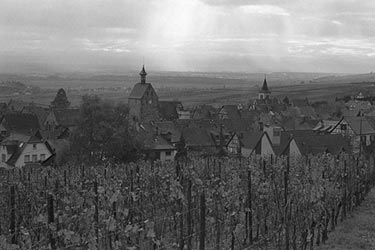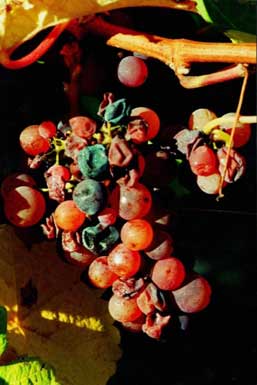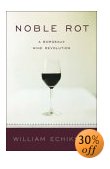

| Terroir-France Tell
a friend! Contact
us: French
Wine Poll Cheese-France: French Cheese Guide Cuisine-France:
French Cooking & Recipes This
material may not be published, rewritten, or redistributed |
![]()
Page 5 of the interview with
Etienne Hugel
Although you own some Grand Cru (great vintage) vineyards, there is no mention of Grand Cru on the label and no promotion made, why?
This is a long debate. You can visit our web site where you can read two pages about it (http://www.hugel.com/en/index_en.html).
More than half of our vineyards are on great vintage terroirs. We do not assert these Grands Crus on the label in order to show our disapproval of the legislation and the delimitation set up by the INAO (office regulating the appellations in France). It is made with commercial view in mind without taking into account quality and specificity. For example, some great vintage vineyards cover 75 hectares (185 acres) all in one piece, which is not very good for our credibility.
We fully recognize the remarkable work carried out by the appellation pioneers: Faller, Humbrecht, Deiss. They are unfortunately only the top of the iceberg.
From the consumer point of view, there is no evidence that Grand cru on the label means that the wine is better. There is no guarantee of quality. Quality is related as much to the producer as to the soil and the terroir.
Hugel has developed the process of Vendages Tardives (late harvest) in Alsace, would you tell us a little bit about it?Hugel produces 1,300,000 bottles in total. Only 2 to 3 % of the production is Late Harvest. And still, it depends of the year. In 2004 we did not make any Vendange Tardive.
These over-ripeness wines have been a tradition in the Rhine Valley for many centuries. We found bottles of 1865 which are still good to drink. Michael Broadbent tasted one recently and gave 5 stars: "Still quite unbelievably perfect" he said!
Vendage Tardive (late harvest) is produced with noble rot such as a Sauternes. For historical reasons, following the German annexation, this tradition more or less disappeared from Alsace. Our family is one of the last to have maintained the torch. We never stopped. Until 1959 the late harvest was marketed under a German name: Auslese. From 1959, we translated the Germanic term and from now on we use Vendange Tardive.
Until 1983, we were the only one to produce those. So the INAO (office regulating appellations in France) in the Seventies asked our family to write a bill project to regulate the Vendange Tardive term. Today the bill is in force in all the wine Alsace region. It sets up a very strict control of the conditions of production of these wines.
It is the pride of the Hugel family to have set up the most strict regulation of all the French appellations. It is my uncle and my grand father who wrote the bill. For example, it is stipulated that chaptalization is prohibited whereas in Sauternes it is authorized.
With a system of control and follow-up which in guaranteed credibility, it is impossible to find on the late harvest market wine which does not have a qualitative minimum. We can be sure of a minimum level of quality when a late harvest is bought.
Are wines from noble grape selection better than late harvest?Indeed, noble grape selection is a quality level above late harvest. It is the quintessence of wine in Alsace. We sort grapes, grape by grape to keep only the best. It is pure noble rot.
The ratio of production is 1 to 10, i.e. a bottle of noble grape for 10 bottles of late harvest.
There are minimums of maturity. For the late harvest, the minimum is 15.3 of potential alcohol, for the noble grape it is 18.2. Only three degrees is a huge difference, a whole world between the two!
Read more
Etienne Hugel
Go back to the beginning of the interview with Etienne Hugel
Riquewihr
Botrytis (noble rot)
on Gewurztraminer
Noble Rot: A Bordeaux Wine Revolution
by William EchiksonWall Street Journal columnist
Explain how the Bordeaux wine industry has changed over the years
Learn morePrice: $18.00 (save 30%)
french wine regions | grape varieties | winemaking | classification in France | tasting | wine and food | wine and health | legendary wines | french wine news | wine shop | french wine guide









